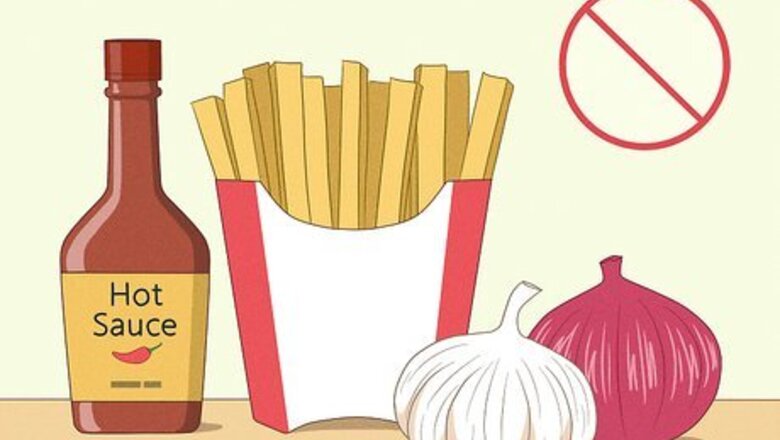
views
X
Trustworthy Source
Mayo Clinic
Educational website from one of the world's leading hospitals
Go to source
Here are 12 effective ways to treat acid reflux.
Cut back on spicy, fatty, and salty foods.

Foods high in salt, fat, or spice tend to promote acid production. Cutting back on these ingredients and dishes may help the acids in your stomach stay stable. See if reducing how much fat and salt you incorporate in your diet helps curb your acid reflux, and avoid overdoing it with the spicy ingredients to keep your stomach calm. Specific foods that may make acid reflux worse include: Salsa, hot sauce, and wasabi. Garlic and onion. Fried or greasy foods. Tomato based foods like pizza, pizza sauce, spaghetti sauce, or marinara sauce. Acidic foods and carbonated drinks may also trigger acid reflux.
Eat more fiber, alkaline foods, and water-based foods.

These foods will help settle the acids in your stomach to prevent acid reflux. Fiber helps by keeping you from overeating, which is a big part of avoiding acid reflux. Alkaline foods balance out acids in your stomach, a food with a high-water content can help dilute any acids you consume. Foods high in fiber include: Whole grains like oatmeal, couscous, and brown rice. Carrots and beets. Green vegetables. Alkaline foods include: Bananas, melons, and cauliflower. Fennel and nuts. Foods with a high water content include: Watermelon, celery, and cucumber. Soup.
Have smaller meals more frequently.
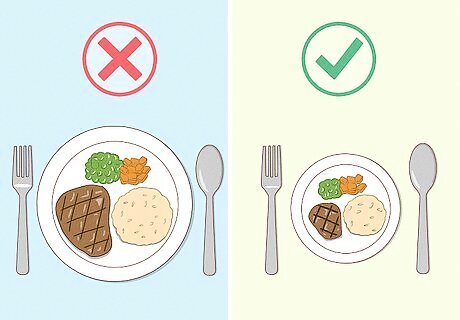
Eating larger meals makes it easier for acids to come back up. When you eat a big meal, it causes your stomach to stretch. This puts excessive pressure on lower esophageal sphincter (the ring of muscle that controls the opening between your stomach and your esophagus). This allows acid and other stomach contents to enter your esophagus. Aim to eat smaller portions, and give yourself 10-15 minutes after finishing a dish to see if you really need a second serving. Wait until you no longer feel full before eating more food. Eating 4-6 small meals every day is not only going to help treat your acid reflux, it’s also a great way to help you lose weight, maintain a healthy metabolism, and stay energetic throughout the day!
Sit or stand instead of lying down after eating.
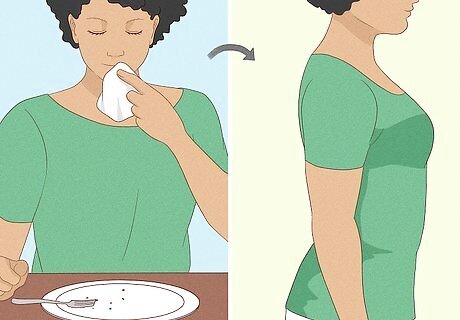
Remaining upright utilizes gravity to keep acids down. If you can’t stand, at least sit up. Any acids in your gut will be less likely to come back up if your digestive system remains upright. After eating, don’t lie down or lean back in your chair for at least 3 hours, if possible. Avoiding post-lunch naps and midnight snacks will help here as well. You don’t want to do any heavy exercise after eating, either. Just take it easy and try to stay upright! Elevating your head while you sleep is a great way to avoid acid reflux in the middle of the night or early in the morning. This is especially helpful if you happen to eat before bedtime.
Wear loose-fitting clothing to give your stomach space.
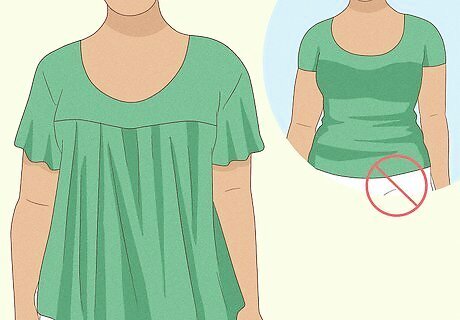
Giving your gut room to breathe may help reduce the odds you get acid reflux. On its own, wearing loose clothing is unlikely to make a huge impact, but it’s definitely going to help if you’re taking other steps to prevent acid reflux. Tight waistbands compress the internal organs and may block digestion. Wear pants and skirts with elastic waistbands. If you wear form-fitting clothes and heavy fabrics at the office, change into sweats or other comfortable clothing as soon as you get home. Loose-fitting clothing can also be a lot more comfortable for most folks!
Maintain a healthy weight to take pressure off your stomach.
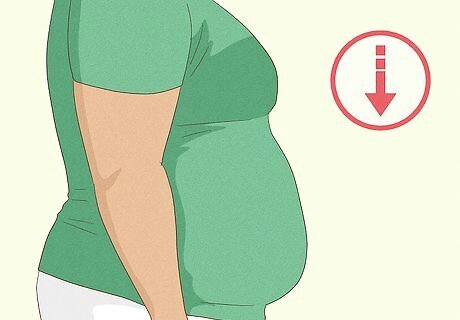
If you’re overweight, shedding a few pounds will have a huge impact. Losing weight will help a ton, since obesity is a major risk factor for chronic acid reflux. It’s not entirely known why obesity causes acid reflux, but it appears that extra weight puts pressure on the sphincter between your stomach and your esophagus, which causes acid to rise back up. Diet and exercise may eliminate symptoms without requiring further treatment. Talk to your doctor or a registered dietitian to get advice on how to lose weight safely and effectively.
Stop smoking to keep your esophagus healthy.

If you’re a tobacco user, smoking will likely make your acid reflux worse. When you smoke, the smoke travels through your throat and grazes against the muscle that protects your esophagus. Over time, this can wear down that muscle and make it easier for acids to come back up. Talk to your doctor about quitting smoking if you’re an active tobacco user. Nictoine-replacement therapy, like nicotine gum or patches, can be highly effective when it comes to quitting permanently.
Take an antacid to soothe your symptoms.
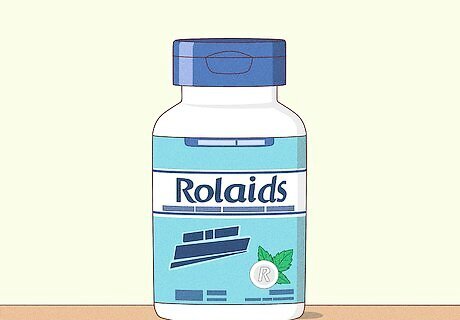
A simple antacid will quickly curb any irritation you experience. It’s not a cure to your problem, but antacids like Mylanta, Rolaids, and Tums will definitely help you find relief in the moment. Antacids act quickly to neutralize stomach acids, so don’t take them multiple times a day as overusing antacids may cause diarrhea. If you take multiple antacids every day, it may eventually lead to kidney problems. They’re perfectly safe every now and then, but don’t take them daily. Antacids can affect the way your body absorbs other medications. Take any other medicine at least 1 hour before or 4 hours after taking antacids. Check with your doctor to find out how antacids might interact with your other medications.
Talk to a doctor about probiotics.
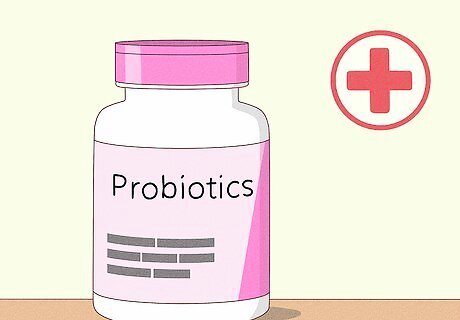
Probiotics may help balance out stomach acids, but they aren’t for everyone. Some people experience acid reflux because their stomach acid levels are naturally a little off, which can contribute to poor digestion and lead to acid reflux. Talk to your doctor about whether your acid reflux might be related to stomach acid issues, and ask them if digestive enzymes and probiotic supplements might help. For some people, probiotics may actually make the problem worse, so definitely discuss this with a doctor. Even if eating something like probiotic yogurt won’t really do any harm to your health, it may exacerbate your acid reflux depending on your other conditions and overall health.
Take H2 blockers if you expect to get acid reflux.
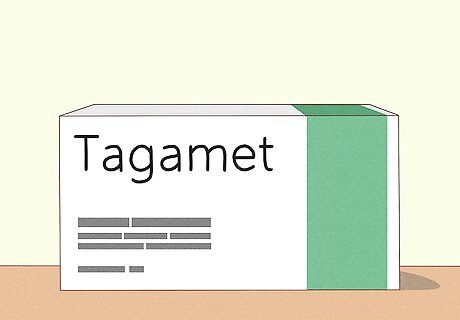
If you suspect you’ll get acid reflux soon, take an H2 blocker. Medications such as ranitidine (Zantac), cimetidine (Tagamet) and famotidine (Pepcid) act to block the histamine receptors that signal your stomach to produce acid. This makes them a great choice if you’re trying to prevent acid reflux if you expect you’re going to have it in the next couple of hours. H2 blockers are generally safe, and you can buy them over-the-counter. Talk to your doctor if you have any side effects or have questions about these medications. You can also take an H2 blocker to treat acid reflux after it has occurred, but they take roughly an hour to kick in, and acid reflux often goes away on its own before the H2 blocker starts working.
Ask a doctor about omeprazole for chronic acid reflux.
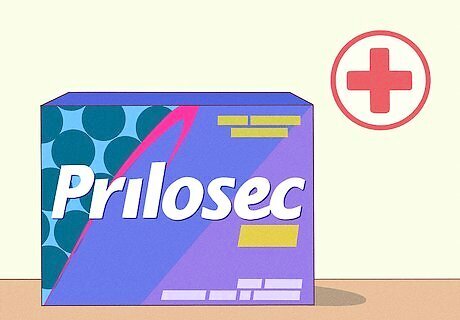
If you have regular acid reflux, taking omeprazole daily will help. Omeprazole (Prilosec) is mainly thought of as a medication for heartburn, but it’s a good option for long-term acid reflux issues. Studies show that taking 20 mg of omeprazole once a day will dramatically help with chronic acid reflux. However, omeprazole can interact with a lot of other medications, so talk to your doctor about this before you pick some Prilosec up at the store and start taking it. Other medications in this class that may help include Prevacid and Nexium. However, most of the research on this class of medication have been on omeprazole, so that’s likely going to be your best bet.
See a doctor if you have chronic acid reflux.
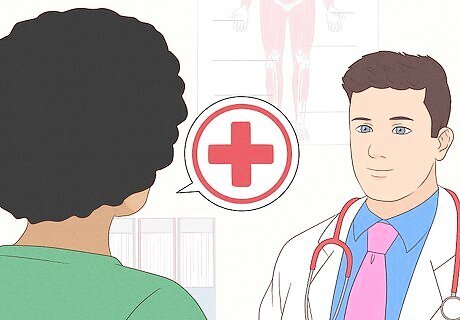
If you’ve been trying to treat chronic acid reflux on your own, see a doctor. Chronic acid reflux, also known as gastroesophageal reflux disease (GERD) is a diagnosis on its own. However, there are a lot of underlying conditions that could be making the problem worse, and there are long-term complications you need to keep an eye on. If it’s especially bad, they’ll be able to walk you through potential surgical solutions as well. If GERD goes untreated, it could lead to permanent damage to your esophagus or increase your risk for cancer. Laparoscopic antireflux surgery is typically necessary if lifestyle changes and medications are unable to treat acid reflux and it’s a regular problem interfering in your life. It’s a minimally-invasive procedure that involves putting a valve on the esophagus to keep acids from coming up.




















Comments
0 comment